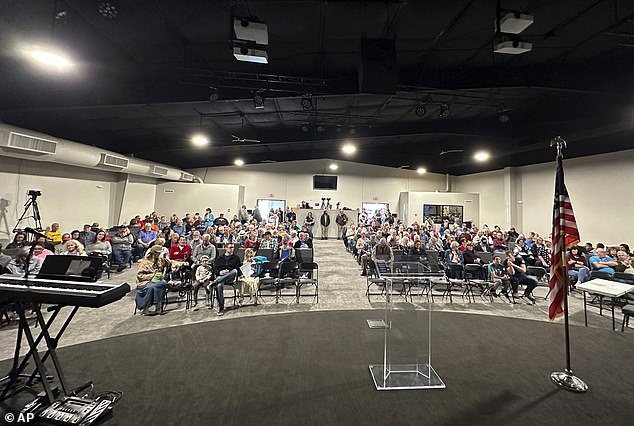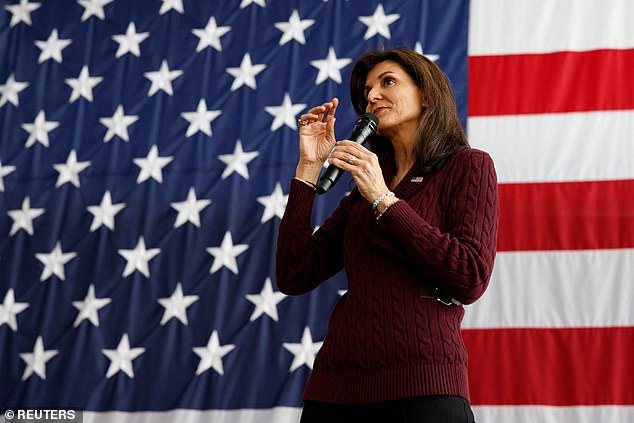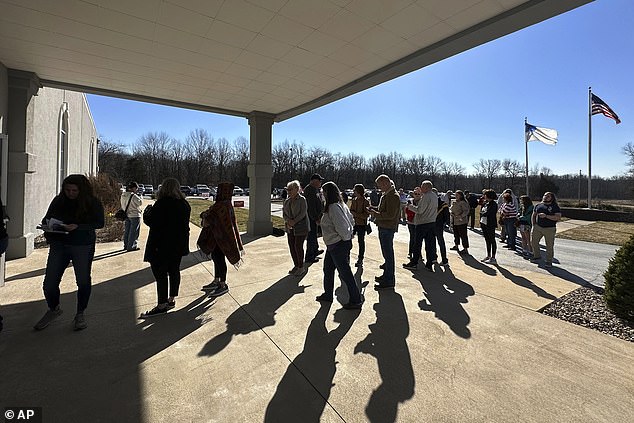Donald Trump defeated his rival Nikki Haley to win the Missouri Republican caucuses.
The race was called just under two hours after statewide meetings began.
The Missouri caucus is one of three events Saturday that will award delegates for the Republican Party’s presidential nominations.
The former president, who is especially strong in caucuses, was widening his delegate lead in Republican caucuses in Missouri, as well as at a party convention in Michigan. Idaho was scheduled to hold its caucuses later Saturday.
Meanwhile, former UN ambassador Haley is still seeking her first victory. There are no Democratic races on Saturday.

Donald Trump won the Missouri Republican caucuses on Saturday


Trump’s victory in Missouri was called just under two hours after caucus meetings began across the state to award 51 of Missouri’s 54 Republican delegates.
Voters gathered to award 51 of Missouri’s 54 Republican delegates.
They lined up outside a church in Columbia, home of the University of Missouri, before the doors opened.
“I don’t know what my role will be here, other than being in Trump’s corner,” Columbia resident Carmen Christal said, adding that she’s “just looking forward to this experience.”
This year will be the first test of the new system, which is run almost entirely by volunteers on the Republican side.
The caucuses were organized after Republican Gov. Mike Parson signed a 2022 law that, among other things, canceled the presidential primaries scheduled for March 12.
Lawmakers have failed to reinstate the primaries despite calls to do so from state Republican and Democratic party leaders. Democrats will hold a party-run primary on March 23.
Trump prevailed twice under Missouri’s old presidential primary system.
Next week on Super Tuesday, 16 states and American Samoa will hold primaries in what will be the biggest voting day of the year, aside from the November election. Trump is on track to secure the nomination days later.
Michigan Republicans at their convention in Grand Rapids on Saturday began allocating 39 of the state’s 55 Republican presidential delegates.
But a significant portion of the party’s grassroots forces were absent from the meeting due to the lingering effects of a months-long dispute over the party’s leadership.


Meanwhile, former UN ambassador Nikki Haley is still looking for her first victory.


Missouri voters gather on Saturday, March 2, 2024 at the Family Worship Center in Columbia, Missouri, to rally the Republican presidential candidate.
Trump handily won the Michigan primary last Tuesday with 68 percent of the vote compared to Haley’s 27 percent.
The next race is Sunday’s Republican caucus in the District of Columbia.
Last year, Idaho lawmakers passed cost-cutting legislation aimed at moving all of the state’s primaries to the same date in May, but the bill inadvertently eliminated the presidential primary altogether.
The Republican-led legislature considered holding a special session to reinstate the presidential primaries. but they failed to reach agreement on a proposal in time, leaving both parties with presidential assemblies as their only option.
The Republican Party presidential caucuses will be Saturday, while the Democratic caucuses won’t be until May 23.
The last GOP caucuses in Idaho were in 2012, when about 40,000 of the state’s nearly 200,000 registered Republican voters showed up to select their preferred candidate.
For this year, all Republican voters who want to participate will have to attend in person. They will vote after hearing short speeches from the candidates or their representatives.
If a candidate gets more than 50 percent of the statewide vote, that candidate will win all of Idaho’s delegates.
If no candidate receives more than 50 percent of the vote, then each candidate with at least 15 percent of the total vote will obtain a proportional number of delegates.
The Idaho Republican Party will announce results once all votes statewide are counted.
Trump came in a distant second in the 2016 Idaho primary, behind Sen. Ted Cruz of Texas.

